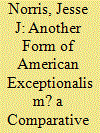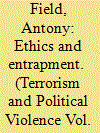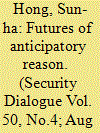|
|
|
Sort Order |
|
|
|
Items / Page
|
|
|
|
|
|
|
| Srl | Item |
| 1 |
ID:
183018


|
|
|
|
|
| Summary/Abstract |
Sting operations can potentially thwart terrorist plots, but could also threaten civil liberties and alienate communities, making them a critical subject for counterterrorism research. Yet despite considerable research on U.S. cases, little is known about terrorism stings elsewhere. How common are such cases abroad, and how many feature strong entrapment claims or result in entrapment-related acquittals? In this study, data are gathered about non-U.S. terrorism stings, each of which is evaluated for entrapment indicators. Results show that, contrary to claims of American exceptionalism, terrorism stings could be identified in twenty-one countries, and the average number of entrapment indicators per case is similar between the U.S. and several countries. In addition, several non-U.S. cases present entrapment claims as strong as some of the most-criticized U.S. cases. However, relatively few non-U.S. terrorism stings (fifty-one) could be identified, while there are 156 U.S. cases. In addition, unlike in the U.S., courts have acquitted defendants on entrapment grounds in a high proportion of non-U.S. cases. Political, cultural, and legal differences between the U.S. and other countries, and certain cross-national commonalities, are identified as likely accounting for these results. Potential implications of these findings for terrorism prevention and legal reform are considered.
|
|
|
|
|
|
|
|
|
|
|
|
|
|
|
|
| 2 |
ID:
166662


|
|
|
|
|
| Summary/Abstract |
This article examines domestic counterterrorism sting operations in the USA. It considers why critics consider these operations unethical and illegitimate. In particular, it looks at claims that counterterrorism sting operations have entrapped innocent people. This article explains why the U.S. courts have rejected claims of entrapment. It discusses different standards of entrapment used by the U.S. courts and sets out how these standards apply to counterterrorism sting operations. The article will show how key pieces of evidence convinced the courts that the targets of sting operations were predisposed towards terrorism. As a result, defendants were not able to mount successful entrapment defenses. By the end of the article, the reader will have a better understanding of the ethical and legal safeguards governing counterterrorism sting operations in the USA.
|
|
|
|
|
|
|
|
|
|
|
|
|
|
|
|
| 3 |
ID:
167408


|
|
|
|
|
| Summary/Abstract |
This article examines invocations of the future in contemporary security discourse and practice. This future constitutes not a temporal zone of events to come, nor a horizon of concrete visions for tomorrow, but an indefinite source of contingency and speculation. Predictive, preemptive and otherwise anticipatory security practices strategically utilize the future to circulate the kinds of truths, beliefs, claims, that might otherwise be difficult to legitimize. The article synthesizes critical security studies with broader humanistic thought on the future, with a focus on the sting operations in recent US counter-terrorism practice. It argues that the future today functions as an ‘epistemic black market’, a zone of tolerated unorthodoxy where boundaries defining proper truth-claims become porous and flexible. Importantly, this epistemic flexibility is often leveraged towards a certain conservatism, where familiar relations of state control are reconfirmed and expanded upon. This conceptualization of the future has important implications for standards of truth and justice, as well as public imaginations of security practices, at a time of increasingly preemptive and anticipatory securitization.
|
|
|
|
|
|
|
|
|
|
|
|
|
|
|
|
|
|
|
|
|